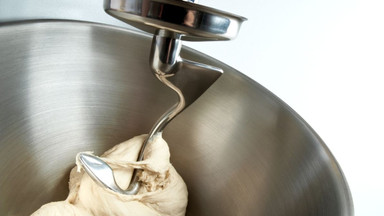Sep 30th 2020
How To Choose an Industrial Dough Mixer
Bakeries, pizzerias, and restaurants have differing needs for mixers. While a pizza place may mix just one or two types of dough for crusts, and a lot of them, a bakery or restaurant may use a mixer for a wide variety of breads, batters, icings, and even mashed potatoes. To help you select the right mixer for your shop, we’ve provided these tips on how to choose an industrial dough mixer.
What Are You Making?
If it’s pizza dough morning and night, you’ll need a powerful spiral mixer. This type of mixer is measured by how much dough it can churn out—denser dough weighs more; a very large spiral mixer bowl can turn out hundreds of pounds of dough in a single batch.
While powerful, spiral mixers aren’t versatile. They typically come with a fixed dough hook. The hook spins and so does the bowl, resulting in an even spin that ensures no part of the dough is overmixed compared to the rest of the batch. Spiral mixers are a type of industrial dough mixer that is good for high-volume operations that need to make a lot of the same kind of dough. They can handle stiffer dough with a lower absorption rate. They can process small batches, even if the bowl can hold a great deal more dough.
If, however, you need a mixer that will handle a variety of batters, icings, bread and pastry dough, and even mashed potatoes, consider a planetary mixer. These have bowls measured in quarts. They also typically have hubs that allow you to switch in attachments depending on the type of batch you’re mixing. With the correct attachments, planetary mixers they can even chop meat, slice veggies, and grate cheese. With these mixers, the bowl is stationary while the agitator moves around the inside of it, like a planet circling the sun.
How Much Are You Making?
A commercial bakery may process hundreds, even thousands of pounds of dough each day. A retail bakery doesn’t need that kind of capacity but does need a machine that can produce a variety of doughs and icings. Planetary mixers range in size from 10 to as much as 200 quarts. Large spiral mixers can manage up to 600 pounds of dough. With that kind of capacity, they come with mechanisms to help raise and empty the bowl.
Motor and Drive System
Horsepower defines a mixer’s power. Dense, low-absorption doughs require a commanding mixer that can handle a heavy mix. The way the mixer transfers power to the agitator through its drive system is also a consideration. Belt-driven systems feature adjustable speeds, but the belts can slip, which slows down the mixer. Gear systems are more sophisticated and long lasting, but they are more expensive to repair than belt-driven mixers. Noise may also be a factor.
Pay attention to size, capacity, power, and versatility when choosing an industrial mixer.

